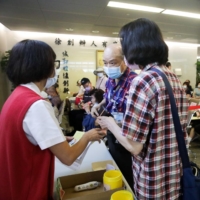Japan announced Friday it was sending some of its COVID-19 vaccines to Taiwan, which has been struggling to procure its own supplies and blamed China for impeding shipments of the shots.
Foreign Minister Toshimitsu Motegi told reporters Japan plans to provide about 1.24 million doses of the AstraZeneca PLC vaccine free of charge. The shipment was expected to arrive on a flight later Friday and Taiwan’s Ministry of Foreign Affairs offered its appreciation in a statement.
Motegi reiterated that Taiwan has an urgent need for supplies of the vaccine as COVID-19 spreads and domestic production is not set to be ramped up until July.
“The provision is based on our important partnership and friendship with Taiwan,” Motegi said, referring to the aid Tokyo received from Taipei following a massive earthquake and tsunami that rocked northeastern Japan in 2011.
He said the offer was arranged on request from Taiwan, which has been grappling with a dramatic rise in coronavirus cases since May and has difficulties in securing COVID-19 vaccines.
The shortage amid rising case numbers in Taiwan has raised fears of a health crisis that could hurt its semiconductor production, which is crucial for global industry.
Taiwanese newspapers on Friday ran front-page articles on Japan’s plan, saying the move reflects the friendship between the two neighbors.
The Liberty Times praised Japan for demonstrating its “guts” in the face of Chinese “threats,” saying that senior Taiwanese officials such as President Tsai Ing-wen had been holding talks with Japan in a bid to receive the AstraZeneca vaccine.
According to the newspaper, former Prime Minister Shinzo Abe encouraged the government of his successor Yoshihide Suga to provide Taiwan with the vaccine, saying, “What Taiwan needs is speed.”
Donating the vaccines to Taiwan could irritate China, Japan’s biggest trading partner, which sees the island as part of its territory and has stepped up military exercises in the region in recent months.
Japan approved the AstraZeneca vaccine on May 20 following domestic testing, but put its use on hold because of concern about rare cases of blood clots. The government has sufficient supplies of other shots to cover its own population and on Wednesday hosted a summit on accelerating global vaccination efforts.
Asked about Japan’s plans on Monday, Chinese Foreign Ministry spokesperson Wang Wenbin said the idea “has drawn doubts from media and the public including in Taiwan.” He added that “vaccine assistance should be restored to its origin purpose, which is to save lives, and should not be reduced to a tool for selfish political gains.”
Taiwan’s government has resisted pressure, both from at home and from China, to work with Beijing to obtain COVID-19 vaccines, a politically unpalatable option for officials in Taipei. Tsai and her party have blamed China for scuttling an earlier order of millions of BioNTech shots, although Beijing has rejected the accusation.
Terry Gou, the founder of iPhone assembler Hon Hai Precision Industry Co., is working with Taiwan’s health ministry to negotiate the purchase of BioNTech SE vaccines, Foreign Minister Joseph Wu said in a video news conference with the Foreign Correspondents’ Club of Japan Thursday. Wu added that Tsai’s administration welcomes any individuals or organizations that want to work with the government to secure vaccines for Taiwan.
Taiwan stands to receive vaccines from the United States. The administration of President Joe Biden plans to distribute globally 25 million COVID-19 vaccine doses, with 7 million destined for Asia.
Taiwan has so far been unable to directly obtain Pfizer Inc.-BioNTech vaccines from Shanghai Fosun Pharmaceutical Group Co. The China-based drugmaker, which has an agreement to develop and distribute them in the greater China region that includes Hong Kong, Macau and Taiwan, has repeatedly said it wants to supply the BioNTech vaccine to Taiwan.
In a time of both misinformation and too much information, quality journalism is more crucial than ever.
By subscribing, you can help us get the story right.
SUBSCRIBE NOW



